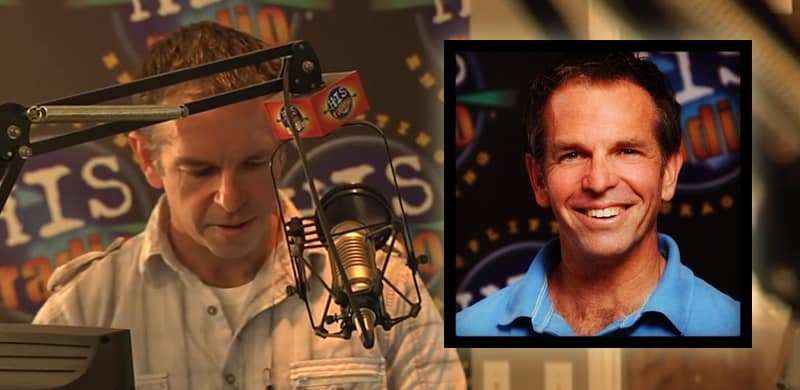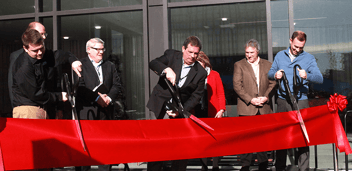
ROB DEMPSEY
Favorite New Single You’re Currently Spinning:
“‘Feel It (feat. Mr. Talkbox)’ by TobyMac. I dig it.”
Most Overplayed Song in Christian Music:
“That’s tough because radio stations are doing such a great job of researching. When we see numbers that are high, if [listeners] want to keep hearing MercyMe, ‘I Can Only Imagine,’ you just can’t not play that song! But if I hear that song again, I need an airsickness bag!”
Most Cherished Item in Your Office:
“A Neumann microphone…that a dear friend gave me back in 1995. This is the old German, beautiful sounding, rich microphone that you’ll see artists singing on… It just has a lot of sentimental value.”
Most Memorable Artist Encounter:
“I would say the most meaningful for me was when I first got started in contemporary Christian radio… Here I am a kid and I’m finally in radio, and I’m at a concert and I have the opportunity to talk to David Huff from David & The Giants and all I could do was tell him, ‘Thank you for your songs, because when I was sleeping under bridges, you sang to me and let me know that God loves me.’”
GMA Industry Executive Interview: Rob Dempsey
Operations/Program Director/Morning Show Host, HIS Radio Network
By Lindsay Williams
Rob Dempsey says he was a “throwaway teenager.” On his 16th birthday, his mom kicked him out of the house. Homeless, Dempsey lived on the streets, couch-hopped and stayed in friends’ garages. One night when he was scrounging for food, he stumbled upon a Sony Walkman and began to listen to Christian radio. In between songs, the DJs reminded the young, lost teen that he wasn’t alone and that God loved him. When one of the on-air personalities led the sinner’s prayer during his shift one night, Dempsey says, “I prayed it, and I meant it; and I said, ‘God, I kinda want to do what that guy’s doing.’ … So I’m a product of what we do with Christian radio.”
Dempsey has worked for HIS Radio, based in Greenville, S.C., for 15 years but has been a part of parent company, the Radio Training Network (RTN), since it began in 1989. One of the most creative on-air personalities in Christian radio today, Dempsey and his team continue to think outside the box with the creative ways they’re engaging listeners—from videoing all of their morning shows and Skypeing live with artists to cruising around town in their mobile studio.
With all of the changes in technology and the way people are listening to radio, where are you currently putting your energy?
I’m always trying to think into the future of how people are going to be consuming what we do as an industry. You can get your music anywhere. I mean, you name it… When people ask what we’re doing, I always ask them one question and that is, “When was the last time you looked at a video on your phone?” Most people say, “Oh, today.” And some will say, “I looked at one this morning or about ten minutes ago.” Everybody seems to be revolving around their phone, and so at RTN and HIS Radio, we have to look at emerging technology… As we take a look at how people are consuming radio today, I think we need to think beyond what we’re doing yesterday, ‘cause we can get stuck in yesterday and try to play catch up or jump ahead, be innovative, take risks and do something people will gravitate to.
How are you making sure you’re growing with your audience?
I think of a conveyer belt. If our audience is women, 25-54, that’s a conveyer belt that is always moving. There are people who are coming on at the beginning, going through the whole process, and then they drop off at the end when they’re 54 years old. So you’ve got people who are always entering the conveyer belt and then going through that journey of who are our audience is in contemporary Christian radio. What are they doing as they’re coming on to the conveyer belt? How are they consuming, and how do we reach into their heart and into their life? How do we get to where they live?
When you go on a mission trip and you go into a foreign country, you learn their language; you learn their techniques; you learn what they do. Well, by golly, we’re missionaries in our own country, right where we are! And what is their language? They’re doing Twitter; they’re doing Facebook; they’re doing Instagram; they’re Snapchatting; they’re looking at their telephones—they are listening and consuming media there; they’re getting push notifications. So how do we do that? Well, we have an app that all of our stations have that is now in their hands. They can be a part of not just listening, but literally interacting with our radio station and what we’re doing. They can request a song through an open mic. We can do contests right through the app… We alert them when their favorite song comes on, or they can vote for a song.
What else are you doing to set HIS Radio apart in the midst of all of the various formats that radio offers today?
We started something three years ago [where] we thought, Why don’t we start recording the artists that come in here to the radio station so that when [listeners] sign on to the website, they can watch the interview? And then we started getting GoPro cameras, and we found some software on the Internet—[it’s] not a $500,000 unit that TV stations have; it’s like a $1,300 piece of hardware that goes in to interact with the software on your computer that you can mix cameras on… So we started doing interviews like that live and then recording them so people could watch them later. We thought, Why don’t we do the whole morning like this? And then, we started doing that; but we thought, It’s probably kinda boring if they just see cameras going back and forth between faces of radio people who are talking. Maybe we should do like what you see TV news do and utilize b-roll… And so we started doing that, and we started dreaming. We got past the point of “what if” and just said, “Let’s do it!” And we figured out a way to actually do it with a non-profit radio station budget. We just went after it.
What’s one of the biggest challenges that you’re trying to remedy?
When it comes to Christian radio, we hear a lot that our music is “familiar music by unfamiliar artists.” If you say Katy Perry, people know who Katy Perry is. If you say Moriah Peters, people go, “Who’s that?” But if they hear the song, they go, “Oh, I know that song. That’s who does that song?!” Now with the video integration that we do…it lives on our website. So this gives us the ability to [allow] the people who listen to the radio station to build a relationship with the people they hear… When we have an artist on, we want to do more than just talk to the artist, we want to get to know their life. So we do a ton of research, pull up a lot of Instagram posts, and things like that, and surprise them while we are talking to them and make it so compelling and these people so real… People are really interested, and it’s helped us really focus in on the content we provide, because what we’re doing between the songs is going to make the difference.
Do you think traditional AM/FM radio will ever truly go away?
I don’t think so… The airwaves, I think, will still be there, but we’ll have greater competition than ever before. Thirty or forty years ago, cable TV started to come into the equation, and we started thinking, What’s going to happen with the three big networks and the independents that are still around? They haven’t gone away. There’s more competition, but now they’re on cable and they’re on Dish and they’re on satellite. And some of them are starting to wise up and go, Wait a minute, now there’s Apple TV and there’s Roku and all this other stuff… We need to be there, too. And so you see them on the app; and you see them have channels on Roku. And so I think radio follows suit with that type of history. We’ll be here; there will still be ways to listen to it on a radio; there are just going to be different ways as well.
For years, the No. 1 way to break a new artist was through radio. With all of the new music discovery outlets available, do you still view radio as the No. 1 way to introduce new artists?
I don’t think that when it comes to radio and breaking new artists that we’re not a part of the equation; I think we’re still a part of the equation because people are listening to it, but I think [social media and all] these other things help it become even greater than what it can be.
Any artist you name who is in pop culture right now, they have a lot to their advantage… They have all these huge things in pop culture that bring them to the forefront, and so people know them. [Listeners] become a part of their lives; and they become sensations so quickly. When it comes to our medium, we don’t have those kind of outlets, but we have the opportunity to create those outlets. Are they going to be as big as mainstream? Not just yet, but we’re getting there. Look at the hard work that for KING & COUNTRY has done. They’ve been on the “Today” show. They’ve been on Jimmy Kimmel’s show. They’re making a huge impact, because these outlets are bringing them in, and I think that is because of the work that’s been done with contemporary Christian radio and the better job that I think we’re doing as a collective medium and industry…to bring them to the forefront. It can happen; we’ve just got to work hard at doing it.
Is there a way that Christian stations and program directors can better work together toward the common goal of getting the music and the message out there?
I think we need to be very intentional to communicate with each other and not think of each other as competitors… Even though social media has made it a little easier to get to know the artist when you’re trying to do some research before you talk to them and do an interview, sometimes there’s a nugget of information that somebody has learned about that if you share it and somebody else takes it, that benefits all of us.
For more info, visit www.hisradio.com.
##





